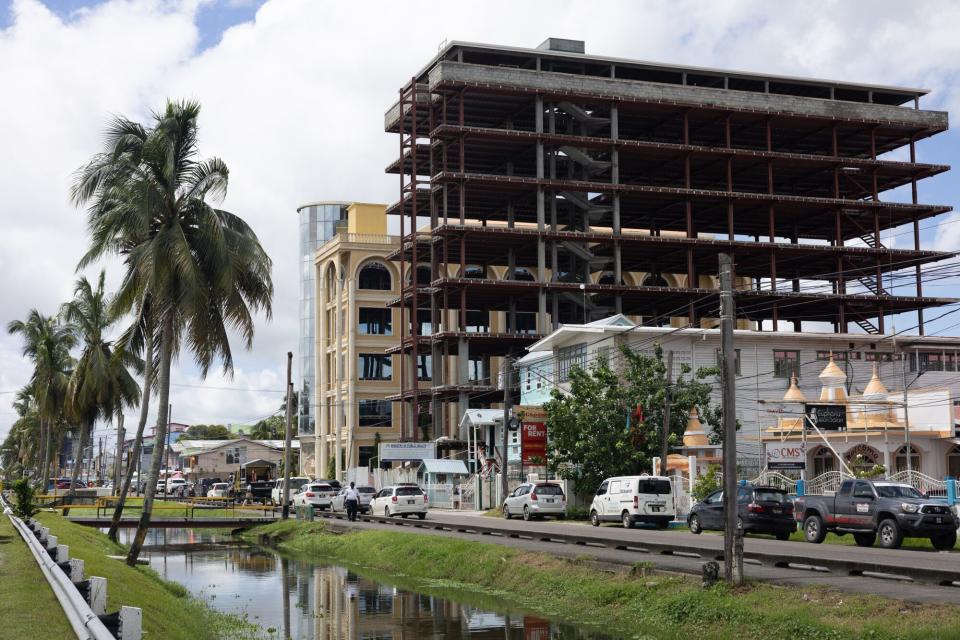Riches From an Oil Boom Prompt Expats to Return Home to Guyana
(Bloomberg) -- Like 80% of Guyana’s college graduates, Richard Singh had left the tiny South American nation for better job prospects abroad. Then, in a surprising turn of events, he realized he could make more money back home.
Most Read from Bloomberg
Democrats Question Replacing Biden: Here’s How It Could Work
Supreme Court Overturns Chevron Rule in Blow to Agency Power
“It’s happening, and it’s pretty seismic,” his old high school friend Jason Singh, no relation, told him as Exxon Mobil Corp. began producing its first barrels of oil in 2019. Richard, who was working in venture capital in New York City, moved back in 2022.
The pair set up a Mediterranean fast-casual restaurant chain, called Mezze, opening their first location in June 2022. They now have six, mostly in new shopping malls that are springing up around Georgetown, Guyana’s capital city. The average ticket price is about $14 — only slightly lower than similar chains in the US — in a country where nearly half the population survived on less than $5.50 per day as recently as 2019.
“This wouldn’t have been possible 10 years ago,” Singh said in an interview in Georgetown. “The spending power is different.”
Returning expatriates like Singh are emerging as one of the early beneficiaries of Guyana’s oil boom, which is calling back some of the country’s nearly 40% who moved overseas. Their entrepreneurial ventures will play a key role in determining whether the world’s newest petrostate can grow into a diversified economy, or fall victim to the resource curse, whereby commodity revenues leave countries poorer and more corrupt.
It will take years, if not decades, to know the answer. But what’s clear now is that money is flowing. And expatriates, armed with capital, skills and local knowledge, are well placed to take advantage.
From 2016 to 2023, Guyana saw net migration of 122,000 people — a significant figure for a country with a population of 780,000, about the same as North Dakota.
Dwayne Cummings, 35, spent a decade in the US and went to college in Miami but returned to Guyana in 2015 full time to help his family’s food business as Exxon was preparing to drill the Liza well that transformed the country’s fortunes. He acquired local franchises for Burger King and Thai Express and plans to add Papa Johns later this year. Sales are up 40% year-over-year and Cummings expects 25% annual growth for the next four years.
“It’s tangible that you see a trickle down,” he said. “Guyana is a unicorn to say the least right now.”
Guyana was the world’s fastest-growing economy in 2022 and expanded a further 33% last year, almost exclusively due to oil. The country is on track to pump more crude per person than Saudi Arabia or Kuwait by 2027. President Irfaan Ali plans to use oil revenues — expected to rise 50% to $2.4 billion this year — to create jobs now, and to ultimately diversify the economy.
Construction is leading the way. Guyana is building 12 hospitals, at least half a dozen hotels, a bauxite mine, several highways and a road to Brazil that will include 45 bridges.
“Infrastructure is going to be nuts, it’s already nuts,” said Rowena Rambaran, who returned to Guyana from Miami when Exxon began producing oil in 2019. “I don’t know how Guyana is going to be able to keep up with this boom. Things are happening so fast.”
In Georgetown, trucks carrying construction materials clog up its single lane road to the airport well before dawn. High-rise cranes dominate its palm-tree lined skyline, and black-limo motorcades whisk oil executives to new glass-panel office blocks that now tower over fading colonial-era buildings. Land prices have quadrupled in some areas since 2019.
Rambaran set up a logistics firm to procure cranes, trucks and lighting for international construction and engineering companies, some of whom work for Exxon. Her extensive network of family and business contacts gives her an edge over newcomers from overseas.
“You know somebody who knows somebody to get stuff done,” she said.
With next to no private equity or venture capital, entrepreneurs in Guyana rely on local banks, who tend to lend only to those with hard collateral like a building or established revenue streams. This favors expats over locals starting a business from scratch.
One local bank conducted a detailed tour of Mezze’s facilities as part of a $300,000 loan application that took more than a month, Singh said. By contrast, he recently got approved for a $100,000 small business loan in the US in less than 15 minutes.
“Whoever has access to cash wins,” Singh said.
Like many oil-led booms, Guyana is showing signs of strain. Skilled labor is in short supply and many say inflation is much higher than the government’s official measure. Teachers have been on strike for eight weeks this year demanding back-pay increases of as much as 25%.
All the entrepreneurs interviewed said they’re hiring every week. Cummings raised wages for his 120 restaurant employees by 30% over the past two years to $450 a month. “You have competing factors — government jobs, construction jobs, health care jobs,” he said. “People jump from one food brand to another, and then back again.”
It’s easy to see why. The cost of consumer staples from markets and grocery stores rose about 16% last year, according to Ram & McRae, a Georgetown-based chartered accountant. That’s far higher than the government’s official rate of 2%, a figure well below even most developed economies. (Vice President Bharrat Jagdeo defended the government’s data saying it was verified by the International Monetary Fund.)
“Prices for items have doubled and tripled so you can understand what the situation is on the ground,” said Martin Aaron Samaroo, a 39-year-old teacher at a primary school. Teachers live on a little more than $600 a month and “have to do two and three jobs just to put food on the table.”
Private-sector employees must now step up to the higher demands of a fast-moving economy or face competition from overseas, said Kishore Angard, Chief Executive Officer of Beharry Automotive Ltd., the country’s official Toyota distributor.
“The economy is moving so fast they risk being left behind,” said Angard, who came to Guyana in 2022 from Trinidad & Tobago. “We’ll import people if we have to.”
Most Guyanese have been through enough economic hardship over the years to realize that the oil boom may not last, and even if it does, it may end up enriching elites at the expense of the wider population. But for now, Guyana’s growth is such that there’s money to be made, according to Singh.
“There’s always that chance the operators go out to the bars a little too much and the projects don’t get done,” Singh said. The country’s compound annual growth rate “is so high it will save you if a couple of investments fall out,” he said. “We’re in the very early stages.”
--With assistance from Denis Chabrol.
Most Read from Bloomberg Businessweek
The FBI’s Star Cooperator May Have Been Running New Scams All Along
Japan’s Tiny Kei-Trucks Have a Cult Following in the US, and Some States Are Pushing Back
RTO Mandates Are Killing the Euphoric Work-Life Balance Some Moms Found
How Glossier Turned a Viral Moment for ‘You’ Perfume Into a Lasting Business
©2024 Bloomberg L.P.

 Yahoo Finance
Yahoo Finance 


